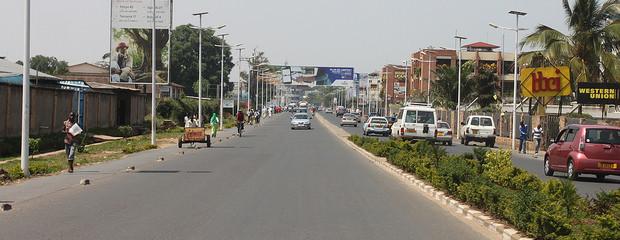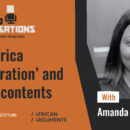Making Sense of Darfur’s Arabs
Darfur’s Arabs are back in the spotlight—as victims, as Janjawiid, and as rebels. The relationship between the Sudan government and the Darfur Arabs has never been simple, and it’s not getting any less so now. Most important is to recognize that Darfur’s Arabs—despite their silence—are nobody’s fools.
Last week, Sam Dealey reported for Time Magazine on how Arab groups had been unreported victims of the war in Darfur. Today in London’s Daily Telegraph there is a report on the Arab militia leader, Mohamed Hamdan "Hemeti", who says he was armed by the Sudan government to mount offensives. On Friday, British TV’s Channel 4’s "Unreported World" carries an exclusive interview with Mohamed Hamdan "Hemeti" at his field base in Darfur, in which he describes both how he was given massive armaments by Khartoum—directly on the orders of President Omar al Bashir—and how he now so distrusts the government that he won’t do its bidding any longer.
What’s going on?
The immediate news is that two of Darfur’s major Arab militia leaders—Mohamed Hamdan "Hemeti" and Anwar Adam Khater (who was featured in a posting by Julie Flint on December 31, 2007)—have signed deals with Khartoum. There are still significant Arab leaders in armed opposition—Yassin Yousif and Saleh Mohamed "Abu Sura" for example—but the incipient Arab rebellion is unlikely to happen.
The reasons why many Arabs were driven to the point of rebellion was that they felt they had been exploited and used by Khartoum, and then abandoned. Some Arab leaders voiced specific demands for compensation—for unpaid salaries, for payments to the families of those killed, and for the support of those injured or disabled in the fighting. These were prominent in a list of demands that Hemeti put to Khartoum last year. Others demanded a stronger deal for Darfur as a whole—economic development, power-sharing, and in fact an almost identical list of grievances to those put forward by the armed movements. These comprise the political manifestos of Khater, Yousif and Abu Sura.
Why are two of the most important Arab military leaders back with the government? A big part of the reason is that, having jumped out of the government’s alliance, they found nowhere to land. Some Arab groups succeeded in making an alliance with JEM, but Hemeti and Khater didn’t. They didn’t trust JEM—their assessment is that "Khalil Ibrahim is fighting for N’djamena or Khartoum—not for Darfurians." Abdel Wahid al Nur was a more attractive ally for them, because he has always kept the door open to Arabs and stressed that they are an integral part of Darfur. But the Arabs found Abdel Wahid to be unreliable. He kept changing his baseline demands for making an alliance. Sometimes he came with unacceptable demands, for example asking that the Arabs first surrender their weapons to his SLA commanders. His decision to open an SLA office in Israel was also seen by many Arabs as an affront to them. And the idea of seeking support from the international community isn’t workable. Arab relations with the UN and NGOs are strained and they are fearful of that the label "Janjawiid" has stuck to them, and that foreign forces will come to try to disarm them.
But while Hemeti and Khater are back with Khartoum, it’s not the kind of unconditional alliance that the Arab militia leaders enjoyed back in 2003 and 2004. There is little trust on either side. They have been promised salaries for their troops, senior army positions for their leaders, posts in local and state governments, compensation, and (in some cases, it is reported) land. But they don’t expect that Khartoum will honor even half of its commitments. Their alliance with the government is a wary one, which will proceed on a case-by-case basis. Most likely, they will be ready to fight JEM and what they see as a Chadian and Zaghawa agenda, but not fight against the SLA-Abdel Wahid and the Fur. For example, it is interesting—and encouraging—to note that Hemeti’s forces are still maintaining local peace agreements with the Fur in areas north of Nyala.
Darfur’s Arabs have been very poor at telling their story. They lack the internal political cohesiveness and organization to form a common front, but their identity as Darfurians is emerging as a powerful determinant of their strategies. With nowhere to turn to obtain outside support and recognition, they have calculated that the Sudan government is going to remain the strongest and most capable actor in Darfur—so they will cut deals, but also keep Khartoum at arm’s length. Khartoum, for its part, will continue to play divide-and-rule and to stoke the fires of instability among the Arabs, as it has done among the non-Arabs.







Thanks for an interesting briefing on the latest political developments within the Arab heartland of Darfur.
Is it possible to have a comprehensive matrix developed on the different ethnic groups in Darfur at “tribal levels”, their political affiliations (Khartoum, N’Djamena, other), approximate size and influence, Arab or “African”, neutral/polarized, partners of the Janjaweed/SLA etc, so that one can follow the patchwork of developing political affiliations?
Or, alternatively, has this already been done?
Because your presentation only gives a limited view of what is actually going at a more comprehensive political level within Darfur.
The UN and AU have drawn up a conflict map which is helpful in identifying the numerous local conflicts that continue to rage in different parts of Darfur, and the actors involved. But to my knowledge, no-one has yet developed such a comprehensive matrix. The main difficulty that would be entailed is that each grouping is not a constant entity–all are prone to splits and all have multiple and overlapping allegiances. None of the labels, “African” and Arab, pro-Government or rebel, are simple. Everyone has lines open to everyone else.